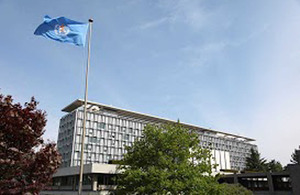UK Statement at the World Health Assembly, Geneva, 20-28 May 2013
UK Health Secretary Jeremy Hunt addressed the 66th World Health Assembly (20 May 2013).

World Health Organisation's Headquarters in Geneva, Switzerland
I am proud to be speaking to you in what is an historic year for the UK. The year in which we have reached our 0.7% development spend target.
For 13 years, the Millennium Development Goals have guided global action to make poverty history. While not every goal has been achieved, their power to unite is undeniable.
Bill Gates called the goals: “the best idea for focusing the world on fighting global poverty that I have ever seen.”
As a consequence of the MDGs:
- Every year, 5m fewer children die for want of illness or malnutrition;
- The global HIV, TB and malaria epidemics have been halted and reversed;
- Two-thirds [64%] of children around the world are now vaccinated with WHO-approved vaccines;
- And in Pakistan, one of the few remaining Polio strongholds, in 2012, there was a 70% fall in the number of polio cases.
We have achieved a lot together, but it’s not over yet. Over the next 1,000 days to 2015, we must re-double our efforts to make progress on the most off-track MDGs.
A priority for the UK is to strengthen the global effort to improve nutrition. In June, we will host WHO and member states at a high-level ‘Nutrition for Growth’ event in London.
We must also look beyond 2015. To take the next steps towards the eradication of poverty and disease. To build on what we have achieved and go further. And to secure global acceptance for the principle that universal healthcare coverage must be a key objective for all countries if we are to live up to our shared ideals for humanity.
Our efforts must continue to focus on improving the lives of the very poorest, with health as a central part of this. For without health, there can be no development. And without equity in healthcare provision, there can be no development to be proud of.
So its time to raise our ambitions. As we move beyond 2015, we must work together to:
- Finally eradicate the scourge of polio;
- To win the fight against HIV, TB and malaria;
- To Improve the health of children and their mothers, and
- To improve nutrition, which can underpin so much else
We also need to tackle urgently the challenges associated with an ageing population, in particular dementia. Dementia is what cancer was in the 1960s - something people don’t like to talk about and something that families have to deal with across the globe. But unless we deal with the taboo and stigma associated with it, we will deprive millions of people of the medicines and support to help them live happily and healthily at home.
So as part of the UK’s chairing of the G8, this year Prime Minister David Cameron has announced that we will hold a dementia summit in London. I am delighted we are doing this in partnership with my US and Japanese colleagues and we hope too with you, Madam Director General.
Antimicrobial Resistance
But there is one issue, not part of the original Development Goals, that if we do not address, everything we have worked so hard for, everything we have achieved, everything we hope to achieve, will be threatened – the growing threat from antimicrobial resistance.
Since the Second World War, the widespread use of antimicrobials have saved countless lives. Almost eliminating the risk from infection from everything from a surgical procedure to a grazed knee.
But this remarkable story may be drawing to an end. The drugs don’t work as they once did and there is nothing in the pipeline to replace them.
We face the prospect of returning to 19th century medicine, where even the most minor procedure could prove fatal.
So we must slow the development and spread of antimicrobial resistance with a better understanding of AMR, and how resistant strains develop and spread.
Second, we need to maintain the efficacy of our existing arsenal of antimicrobials for as long as possible with far stricter adherence to infection control and prevention.
Too many health professionals see antibiotics as a first line of defence, not as a precious resource only to be used in the right way, at the right dose and for the right amount of time.
And third, we need to support the development of new AMRs and alternative treatments. At the moment, it doesn’t pay for drug companies to invest in research for new antimicrobial medicine. The WHO, the EU and other partners need to step up to fill this gap, to encourage new research and new and novel therapies.
The Millennium Development Goals have proven what we, the global community, are capable of when we work together in unison. Let’s harness that ambition and energy to promote universal healthcare coverage, a shared approach to new challenges like dementia and concerted global action to tackle public health threats like antimicrobial resistance.
Thank you.